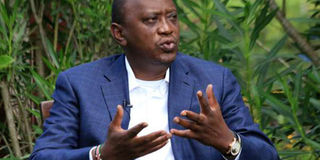Trump snubs Kenya in first Africa outreach

President Uhuru Kenyatta. He want IEBC memos removed from petitions challenging his win. PHOTO | FILE | NATION MEDIA GROUP
What you need to know:
- Kenya’s Ambassador to United States Robinson Njeru Githae has been away from the US capital city for some time.
- Foreign Affairs PS, Dr Monica Juma refused to comment on President Trump’s phone calls to Nigerian and South African leaders.
- Trump’s phone calls to President Muhammadu Buhari of Nigeria and President Jacob Zuma of South Africa represented his first contacts with African heads of state in his capacity as the US president.
- With the Trump administration still in its first month, Kenya has time to recover from its “diplomatic miscue”.
NEW YORK
A “failure of Kenyan diplomacy” is to blame for President Donald Trump’s decision on Monday to make phone calls to the presidents of Nigeria and South Africa but not Kenya, a well-placed source in Washington has told Nation.
“Nigeria and South Africa have been working this for some time,” said the source who is knowledgeable about the Trump administration’s moves to formulate its Africa policy.
“They’ve been in contact. Kenya hasn’t done that,” the source added.
The Washington insider who spoke to Nation on condition of anonymity, noted that Kenya’s Ambassador to United States Robinson Njeru Githae has been away from the US capital city for some time.
Foreign Affairs Cabinet Secretary Amina Mohamed has been “preoccupied with her failed campaign” to become chair of the African Union Commission, the source added.
Contacted, the Foreign Affairs PS, Dr Monica Juma refused to comment on President Trump’s phone calls to Nigerian and South African leaders. She said Kenya doesn’t comment on the activities of the President of another country which do not involve Kenya.
Kenya's Deputy Chief of Mission to Washington David Gacheru told Nation that a telephone conversation between President Kenyatta and President Trump is already in the works.
“It should be taking place within a short time frame. Unfortunately, I do not have further information on an exact time, as these logistics are still being determined by the presidents' staff," Mr Gacheru said.
DIPLOMATIC MISCUE
Trump’s phone calls to President Muhammadu Buhari of Nigeria and President Jacob Zuma of South Africa represented his first contacts with African heads of state in his capacity as the US president.
Kenya should have realised, the source suggested, that “this president is not all that engaged in Africa, and that you need to take advantage of whatever opportunities do arise to engage him and the key people around him.”
However, the source noted that with the Trump administration still in its first month, Kenya has time to recover from its “diplomatic miscue”.
But other Washington analysts contacted by Nation offered a more forgiving view of Kenya’s exclusion from Mr Trump’s first set of calls to African leaders.
“I urge Kenyans not to take this as a slight,” said Witney Schneidman, a former African specialist at the State Department and currently a fellow at the Brookings Institution think tank.
LARGEST ECONOMIES
“South Africa and Nigeria being two largest economies on the continent have always had pride of place in US policy,” Mr Schneidman noted.
“Monday’s phone calls should be seen as an initial outreach to the continent and not necessarily reflective of the Trump administration’s Africa policy,” he added.
Mr Mark Bellamy, a former US ambassador to Kenya, had a similar response to Mr Trump’s omission of President Kenyatta from his call list.
“Mr Trump’s Africa team is not yet in place. The president was likely urged by advisors to reach out to some prominent figures in Africa, so he called the heads of the two largest states,” the former envoy said.
“It was probably reflexive, not the result of any considered judgment about priorities in Africa or the importance of partners like Kenya,” he added.
John Campbell, a former US ambassador to Nigeria and now a fellow at the New York-based Council on Foreign Relations, also pointed out that Nigeria and South Africa have the largest economies in the sub-Saharan region.
“Both are on democratic trajectories,” Ambassador Campbell added. “Both have actual or potential influence throughout the continent. Buhari and (to a lesser extent) Zuma do not have the baggage of Kenyatta,” he wrote in an email.
The former envoy was referring to President Kenyatta’s indictment by the International Criminal Court on charges of crimes against humanity. Mr Kenyatta was charged in 2012 in connection with the 2007-2008 post-election violence. The ICC suspended the case against him two years later.





